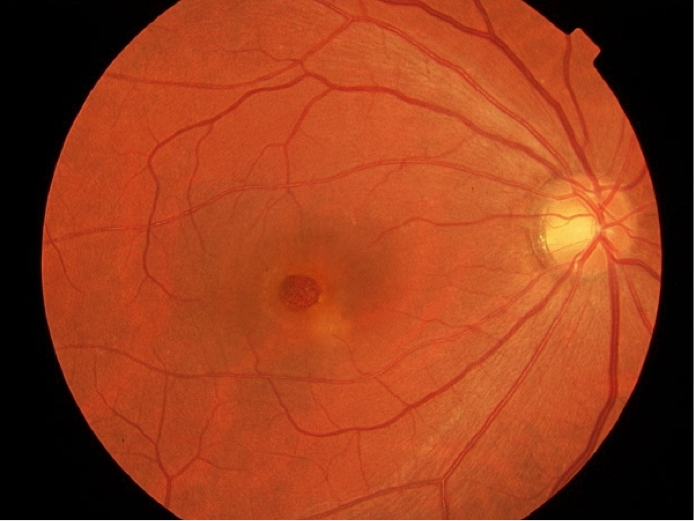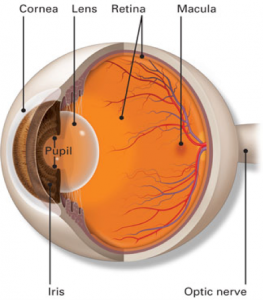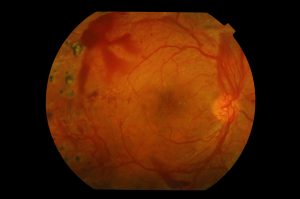3 Common Retinal Conditions and What they May Mean for Your Vision

What is the retina?
The retina is the layer of light sensitive nerve cells at the back of the eye which convert light entering the eye into electrical signals which are then carried to the brain by the optic nerve. Different cells within the retina allow us to see in a range of lighting conditions as well as enabling us to detect colour and motion. Oxygen and other nutrients are supplied to the retina by one main artery and one main vein which enter through the optic nerve then branch out over the retina to form a network of tiny blood vessels. Damage to these cells and blood vessels can result in loss of vision or blindness.

Cross-Section of the Eye showing the Retina
Common Conditions that affect the retina:
Macular Degeneration
Macular Degeneration is a degenerative disease of the centre of the retina called the “macula” that causes progressive, painless loss of central vision. It affects the ability to see fine detail, drive, read and recognise faces. Age Related Macular Degeneration is a leading cause of vision loss in older Australians.
There are two types of AMD:
- Dry Macular Degeneration
- Wet Macular Degeneration
Dry AMD occurs when the cells at the macula start to thin and waste away. It is the most common type of AMD and usually causes slow gradual decline of vision over months and years and in some cases can eventually lead to loss of central vision.
Wet AMD is a less common but more aggressive condition. It is caused by the development of new blood vessels which grow under the macula. These vessels then leak and bleed into the retina. Vision loss from this form of macular degeneration may occur more suddenly and be more noticeable than that from dry macular degeneration.
Diabetic Retinopathy
Diabetic retinopathy is a common complication of diabetes which occurs when uncontrolled high blood sugar levels cause damage to the blood vessels nourishing the retina. There are different stages of diabetic retinopathy, which can impact the health of your vision differently. The early changes are called mild diabetic retinopathy and involve small retinal haemorrhages and dilatation of retina vessels, called microaneurysms. In some cases, there may also be areas of fluid called oedema or fat deposits called lipid exudates. In these early stages, you may not notice any significant changes to your vision, however damage is still being done. If the condition is left untreated and progresses, these small haemorrhages increase in number and the condition is then classed as moderate-severe diabetic retinopathy.
It is during this stage of the disease that significant loss of vision or even blindness can occur. Fortunately, if diagnosed early, diabetic retinopathy can be treated and vision loss can be prevented or reduced.

Severe diabetic retinopathy, with several retinal haemorrhages
Retinal Detachment
Retinal detachment occurs when the retina pulls away from the tissue surrounding it, cutting off the supply of oxygen and other nutrients. Retinal detachment can be either total, when the whole retina separates away from the eye wall or partial, when only a part of the retina is separated. Initially, retinal detachment starts in the periphery causing blindness in the peripheral vision. If the detachment progresses to involve the macula (central part of the retina) then central-vision blindness will occur as well.
The most common cause of retinal detachment is age-related changes to the composition of the vitreous gel within the eye. Contraction of the vitreous can pull on the retina, which may lead to tearing at a weak point in the retina. Once a tear/hole develops, fluid may collect beneath it and reduce the adhesion of the retina to the choroid (surrounding area), resulting in a detachment. When the retina is detached it can no longer function and vision is lost. Aside from age, several other factors may affect the likelihood of developing a retinal detachment. These include; being short-sighted, having a family history of detachment and experiencing trauma to the eye.
If detected quickly, retinal detachment can be treated via surgery to re-attach the retina to the eye wall. Surgery for retinal detachment has a high success rate of more than 90% if treated early.
The important thing to remember when it comes to retinal conditions such as macular degeneration, diabetic retinopathy and detachment is that the earlier the condition is detected; the better your chances of preventing vision loss.
This is why it is important to maintain regular (6 or 12 month) appointments with your eye health professional if you are aged over 50 or are diabetic.
If you have been diagnosed with macular degeneration or diabetes and would like to discuss the health of your eyes please call 03 9459 5133 to make an appointment at Northern Eye Centre, located in the Melbourne suburbs of Heidelberg and Epping.
